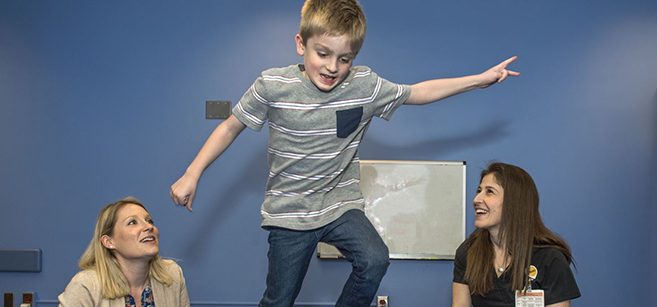Sensory/social skills: 2 to 12 years
Sensory/social skills: 2 to 12 years
Sensory development relates to our senses (vision, hearing, touch, taste, smell) which allow us to explore the world around us. Social skills refer to our interactions with other people.
Why are social skills and sensory skills important?
Social skills help children have positive interactions with each other to make and keep friendships. Social skills for younger children involve understanding how to relate to others. Sharing a toy with other children, apologizing when prompted, and taking turns are important skills for interacting with friends and peers. As children age, social interactions become more complex. Later childhood skills include involve cooperating with adult requests, demonstrating good sportsmanship, playing a group game while following the rules, and initiating conversations appropriately.
Children use their senses to explore and try to make sense of the world around them. They do this by touching, tasting, smelling, seeing, moving and hearing. Sensory play helps language development, cognitive growth, fine motor skills and gross motor skills, problem solving skills and social interactions.
Here are general guidelines for sensory and social development for children ages 2 to 12 years:
2 years
- Uses own name to refer to self
- Some dependent behavior on a caregiver, but clinginess is decreased
- Able to play alone
- Some frustration tantrums are present (but not more than 6 per day or lasting longer than 10 minutes)
- Can tolerate a variety of clothing (does not insist on certain clothing only - e.g., only long-sleeved shirts, tags must be cut out of clothing, etc)
- Eats a variety of foods (not limited to certain color or texture)
3 years
- Has some difficulty transitioning between activities (ex. indoor to outdoor play)
- Participates in interactive games, taking turns with others in play
6-8 years
- Eager to learn new skills and accomplish tasks
- Can share with others and do well in group activities
- Able to handle group situations (e.g., standing in line) without reacting aggressively to being touched
- Has ability to stay seated (not fidgeting all the time)
- Enjoys playground activities (does not seem fearful when feet leave the ground)
- Comfortable transitioning between activities
- Seems organized in work/play space (not always losing things)
- Motor skill level is similar to intelligence level
- Able to function in a noisy environment
9-12 years
- See themselves as individuals, while also spending time and energy on peer relationships
Activities to help sensory and skill development in young children
You can help your young child develop sensory skills by:
Being intentional…It is important to provide a child the opportunity to explore different textures, tastes, and smells. Add a new food to your grocery list for your child to help you prepare in the kitchen and try during a meal. Take a nature walk and gather “treasures” like leaves, sticks, flowers, and rocks. Play Twister or Simon Says to encourage your child to put their body and head in new positions.
Talk about it…Talking about how items smell, taste, or feel helps your child become more familiar with the different senses in the world around them. Everyday activities are full of sensory, we just have to bring our attention to it! Talk about how fuzzy the towel feels during bath time, how cold the water is when washing your hands, or how crunchy the potato chips feel in our mouth.
You can help your young child develop social skills by:
Engaging…Lead by example! Modeling turn taking, rule following in a game, and the sportsman-like way to lose can make a big difference in helping a child develop social skills. Use games that have a central tool or item, like a dice or spinner, to help provide a natural structure for taking turns. Intentionally win and lose during a game to help show your child how to respond to disappointment and success.
Think outside the house…With closures, cancellations, and a shift in the virtual direction, this has been a challenging year to offer children face-to-face exposure to others. As restrictions and health conditions allow, look for opportunities to interact with similar aged children at a playground, through sports teams, and church or community groups. Consider exploring what your local community center or YMCA is offering related to childcare or camps. Spending time with other children is important for building and strengthening social skills and competence.
What if I am concerned about my child's sensory and social skill development?
If you have concerns regarding your child's development or your child is regularly missing development milestones, occupational therapists can assess development and address concerns. If you are concerned about your child's development of sensory motor skills or social skills, a physician or therapist may be able to assist with an evaluation.
Our occupational therapists help address problems related to cognitive, daily living, motor, sensory processing, social and visual/perceptual skill development. Note: Occupational Therapy addresses problems related to cognitive, daily living, motor, sensory processing, social and visual/perceptual skill development.
To make an appointment with a pediatric therapist, call one of these locations:
- Bon Air Therapy Center 804-323-9060
- Brook Road Campus 804-228-5818
- Fredericksburg Therapy Center 540-891-4485
- Glen Allen Therapy Center 804-273-6656
- Petersburg Therapy Center 804-733-7233
- Stafford Therapy Center 540- 659-7337
Information provided by Sallie Tidman, OT/L, Director of Therapy Services, Melanie Koch, Occupational Therapist, and Sarah Phillips, Occupational Therapist.

